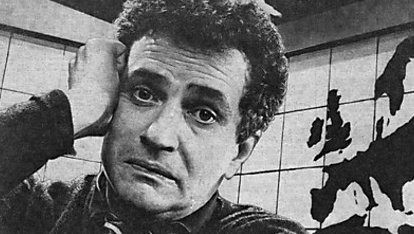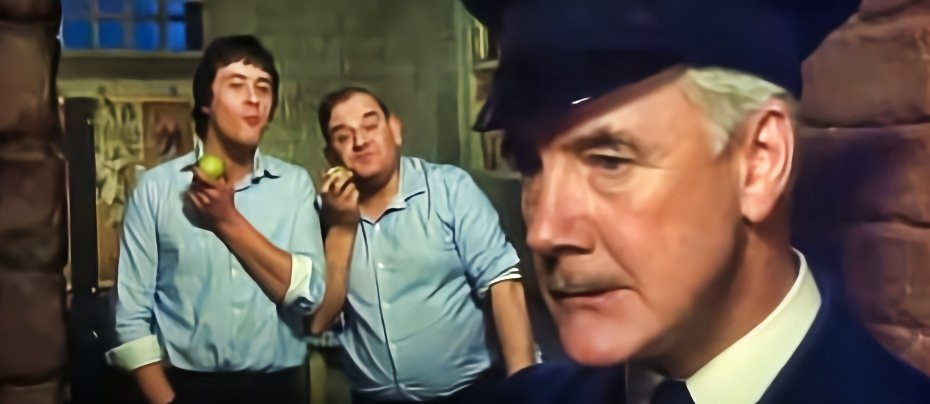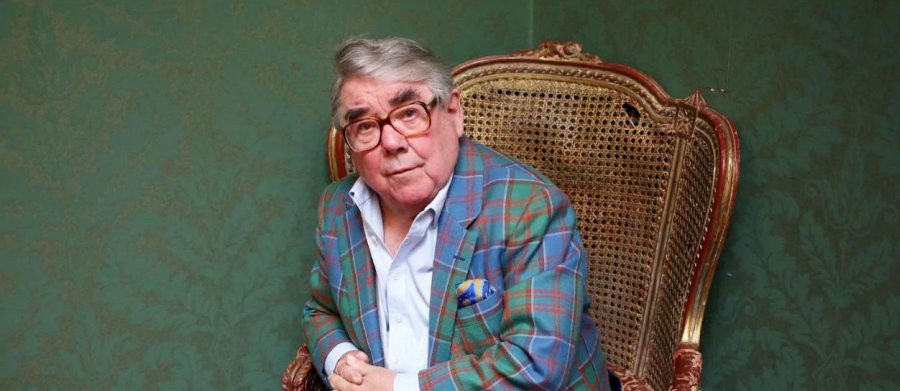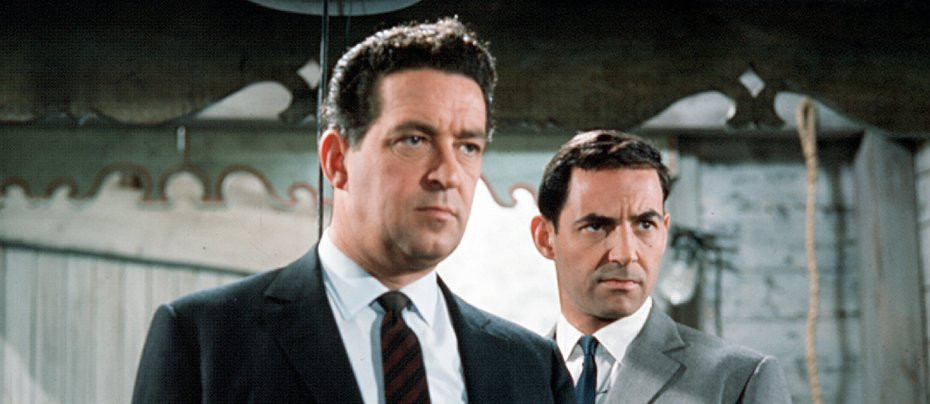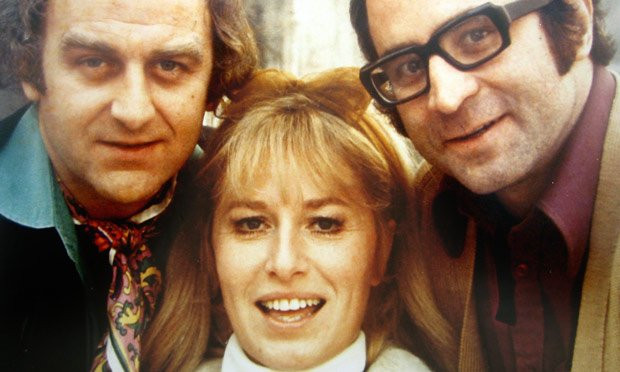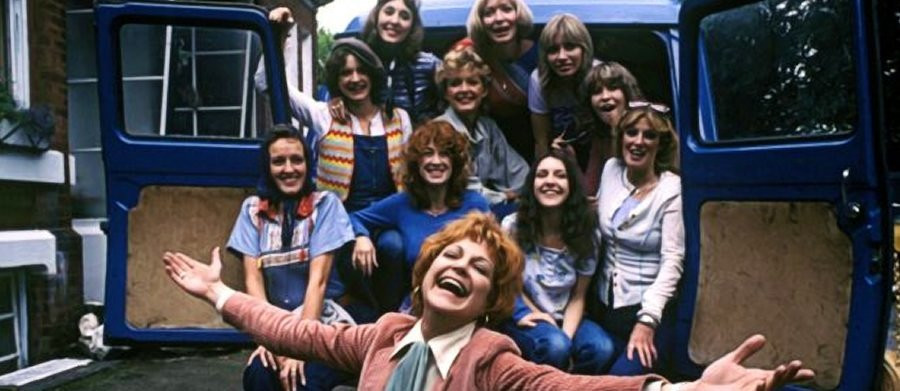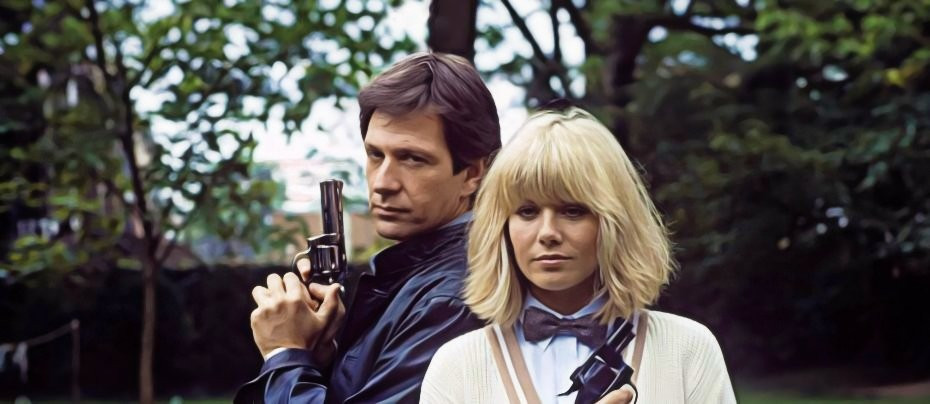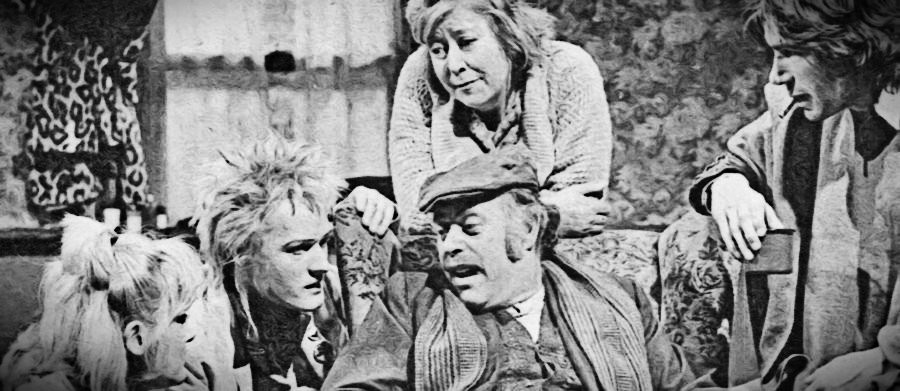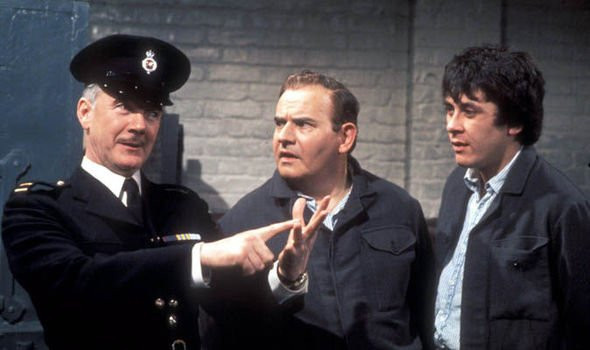
Porridge: Inside and Out
In 1971 Ronnie Barker was thinking about ideas for his upcoming series of one-off sitcoms for London Weekend Television. Out of that series, Six Dates with Barker, came a show about a short-sighted removal man (The Removals Person), which Barker would later develop into his last series before taking early retirement. Another show (The Phantom Raspberry Blower Of Old London Town) would re-appear as a mini-series within The Two Ronnies. One idea that was not developed, however, was simply written down by Ronnie Barker on a piece of paper and then forgotten about. It was just one word. And it read - 'Prison'.
Six Dates with Barker ended on 12th February with All the World's a Stooge. On March 20th Barker opened The Ronnie Barker Yearbook on BBC1, which was made as an introduction to the forthcoming Two Ronnies. Both he and Ronnie Corbett had been signed to a BBC contract that promised a joint series as well as a number of individual projects. In an effort to find Ronnie Barker a solo-starring vehicle Graham Chapman and Bernard McKenna wrote a one-off Comedy Playhouse presentation called Idle At Work. However, no series emerged from this and so, in June 1972, Barker bought back his popular character Lord Rustless in His Lordship Entertains.
The BBC were determined to find Barker a new series and late in 1972 incoming Head of Comedy Jimmy Gilbert decided to do a series of pilots on BBC2, along the same lines of 'Six Dates'. The series was originally to be called Six of One... so the next series could be called ...Half A Dozen Of The Other, but someone at the BBC decided to put out seven shows. To ensure that he had top-quality scripts, Jimmy Gilbert turned to writers he knew and even commissioned more scripts than he required. Two came from Roy Clarke, two from Dick Clement and Ian La Frenais, two from Hugh Leonard, one from Gerald Frow (which Yorkshire Television later turned into a series starring Clive Dunn), one from N.F. Simpson and one from Ronnie Barker himself.
Clement and La Frenais had enjoyed great success in the 1960s with The Likely Lads, a sitcom that proved so popular that the BBC asked the writers to revive the series in 1973. It was arranged that Ronnie Barker would meet the two writers and discuss ideas for his new series. Ronnie Barker takes up the story: 'I always wanted to make a prison series and couldn't believe it when I spoke to Dick and Ian and discovered they'd come up with a similar idea. They were thinking, initially, about an open prison but I didn't think that had enough threat to it, whereas my idea was much more frivolous than Porridge -like 'Bilko' in prison: smuggling women in, that sort of thing.' From these discussions the three of them agreed on a closed prison where the writers could exploit the daily dilemmas facing inmates. 'It was definitely the best way to go,' said Barker. 'My idea would have been geared much more to laughs, whereas theirs possessed more bite.' When the writers sat down to write the episode they found they deviated from the agreed plot. Instead they came up with a story of a man who is released from prison and returns home to find his wife having an affair with his best friend. They called the story Thick As Thieves, but realising they had strayed from what they had agreed with Barker, and not wanting to disappoint the star, they sat down and started again. What emerged this time was a story called Prisoner and Escort.
Prisoner and Escort introduced viewers to Norman Stanley Fletcher, a 42-year old habitual criminal who had spent most of his life in and out of prison. It's New Year's Day and Fletcher, having just been sentenced to yet another term of imprisonment, is being transported by train in the custody of two prison officers, to Her Majesty's Prison Slade, which is situated miles from anywhere in the wilderness of Cumberland. During the journey Fletcher strikes up a conversation with the officers, a no-nonsense strict disciplinarian called MacKay, and the somewhat vague and impressionable Barrowclough.
By the time the train reaches the end of the line, Fletcher has struck up, what he believes to be something of a rapport with Mr Barrowclough. As the officers transfer their prisoner to the waiting van that will take them on the final leg of their journey Fletcher asks to use the toilet. As there isn't one available MacKay tells him to relieve himself at the back of the vehicle. Unseen by the others Fletcher urinates into the van's fuel tank.
On route to the prison and high up on the moors the van breaks down. With darkness closing around them, MacKay sets off on foot to the prison to get help, leaving Fletcher handcuffed to Mr Barrowclough in the cold van. As the temperature drops, Fletcher convinces his gaoler that they will not survive the night without finding some warmth and refuge. The pair set off on foot and find a nearby deserted cottage where Fletcher indulges in a bit of breaking and entering. As Fletcher and Barrowclough settle down for the night they toast in the New Year with a bottle of Scotch that Fletcher had lifted earlier from MacKay's pocket.
As the drink begins to affect Borrowclough, Fletcher convinces him to release the handcuffs. Then, as soon as Barrowclough falls asleep Fletcher makes good his escape. He takes off on foot across country, running for all his worth until dawns early light, when he comes across a cottage. He breaks in and is looking around when he hears a noise. To his astonishment, in walks Barrowclough. Fletcher had been running in circles and has ended up exactly where he started!
Casting for Prisoner and Escort (as with all the shows in Seven of One) was Jimmy Gilbert's responsibility. He'd known Fulton MacKay since drama school and the two were good friends. Fulton had played a similar character, a colonial sergeant, in a series that Gilbert had directed years before, which also starred Terry-Thomas. It was sheer coincidence that the character he was offered in Prisoner and Escort was also called MacKay. It was Ronnie Barker's idea to recruit Brian Wilde.
Prisoner and Escort was the second episode to be made for Seven of One. The director was Sydney Lotterby and the production manager was Ray Butt. Production started at the beginning of 1973, with the team travelling to Caerphilly where another in the series I'll Fly You for a Quid was also to be filmed. Ronnie Barker's lasting memory of the location filming was the bitter cold. Seven of One aired on BBC2 on 25th March 1973 with Open All Hours and was followed the next week (1st April) by Prisoner and Escort. Of the entire series it was Prisoner and Escort that came bottom of the ratings with 1.5 million. When a decision was sought on which of the shows to develop as a full series Ronnie Barker wanted to do I'll Fly You for a Quid but Jimmy Gilbert felt the idea lacked staying power. Gilbert, Barker and then BBC Head of Comedy, Duncan Wood, met at a restaurant and over a meal they decided that although Prisoner and Escort had not fared too well in the ratings, as a series it had more potential.
The only people who weren't too sure were the writers. 'We visited Brixton Prison and met with the governor,' recalled Ian La Frenais. 'But after being shown around the place we felt really deflated, thinking we'd definitely picked the wrong pilot.' Their apprehension didn't ease any after visiting Wormwood Scrubs and Wandsworth Prisons, either. ' Prisoner and Escort was one thing', said Dick Clement, 'but we came out of the prisons and said to each other: "How the hell do we make a whole series based in prison funny?" At the end of the day prisons are grim and we knew our show had to reflect that; it would have been cheap to trivialise it.'
They key to the series was given to them by an ex-convict, Jonathan Marshall who had just written a book called 'How to Survive in the Nick'. Jimmy Gilbert set up a meeting with Marshall and the writers. During the meeting Marshall uttered a phrase that struck a chord with them: 'Little Victories'. Clement and La Frenais went away with renewed enthusiasm. 'We could make a show about a man with a fondness for earning "little victories" -beating the system on a daily basis, even in the most trivial ways' said La Frenais. The writers also picked up a range of prison slang, which would add even more authenticity to their scripts.
At the outset, the main focus for the series was intended to be the ongoing and developing relationship between Fletcher and Barrowclough and how Fletcher would exploit the frailties in the prison warder's character. One new character, meant to be seen in just the first three episodes, was a first time offender by the name of Lennie Godber. The thinking behind it being that as Fletcher teaches young Godber about prison life so the audience would learn as well.
One of the best episodes of that first series (the third episode) was called A Night Inand featured just Fletcher and Godber. The episode was set almost entirely in a single cell and reflected the writer's intention to show the realities of being locked up and deprived of freedom. During the night Fletcher tells Godber about the importance of holding onto his dreams (where there are no locked doors) and by morning the two prisoners had laid the foundation of a strong and lasting friendship.
One other thing was yet to be decided before the series was aired - and that was its title. Although Prisoner and Escort was appropriate to the pilot episode it was clearly unsuitable for a full series. Possible titles were Bird and Stir, but neither of these was deemed entirely satisfactory. According to Barker and the writers, they both arrived at the series title at the same time. Barker walked into the production office one day and announced that he'd thought of a title. 'So have we' said Clement and La Frenais. The slang word for 'doing time' was deemed the most appropriate. Thus, Prisoner and Escort became ...Porridge.
Porridge debuted on 5th September 1974 following a re-showing of the pilot the previous week. 16 million viewers watched the first episode of the new series New Faces, Old Hands, and all the shows in that first season easily made the TV top twenty. Realising that they had a hit on their hands the BBC were keen to push ahead with a second season, which would lead up to a Christmas special in 1975.
Earlier that year Dick Clement and Ian La Frenais received an offer from the ABC network in America to write and co-produce a re-working of Porridge for a US audience. The pair set off for America where they visited a number of prisons in order to understand the different approach they would have to take to accurately reflect prison life in the US. Renamed On the Rocks, the setting was now Alamesa Minimum Security Prison in California. In the Fletcher role was Puerto Rican criminal Hector Fuentes, played by Josè Pères.
Back in the UK the second season of Porridge opened to an audience of 14 million, which grew to an average of 16 and peaked at 16.8. The Christmas special, No Way Out became televisions top rated show for that year achieving an audience of 18.5 million and it was clear that a third series would follow. However, there would be a longer than usual break between series two and three.
With Clement and La Frenais tied to the US series, Ronnie Barker went off and made Open All Hours, a series derived from another Seven of One pilot. But Clement and La Frenais, along with John Rich the US producer of On the Rocks were becoming increasingly unhappy about the compromises they had to make for ABC. They took the edge off the series by insisting it be 'family friendly', and 'hip'. Although the network was happy to press ahead with further series' it was the producers who decided to pull the plug. The writers, however, had now made America their home and they wrote the third (and final) series of Porridge from Beverly Hills. Still, season three maintained a healthy audience average of 15 million viewers and the writing was just as sharp as ever. The final episode wound the series up nicely. In Final Stretch Lennie Godber is up for parole and Fletcher is left to reflect how much of his life has been spent locked up. Instead of seeking 'little victories' he now just wants to bide his time, do his porridge and get out of prison.
It was Ronnie Barker who decided that the third series of Porridge should be the last. 'I didn't want to get stuck with being identified as one character,' he explained. 'I had the awful lesson of Warren Mitchell and Harry H Corbett, you see. They stayed too long in their series.' But even as Porridge was being bought to its natural conclusion Dick Clement and Ian La Frenais were being wined and dined by the BBC. 'It was a lengthy lunch,' recalled Dick Clement. 'It was all very jolly and in the middle of it we suddenly started talking about Porridge.' The writers said that they thought they had explored all the situations within the walls of a prison and any more would become repetitive. However, it would be interesting to see what would happen to Fletcher when he eventually got out. 'Everyone loved the idea and it was virtually commissioned there and then.'
It's now more than forty years since the pilot episode was first transmitted and above any sitcom before or since Porridge has stood the test of time. It is as popular today as it was back in the 1970s with regular repeat runs on satellite channels such as UK Gold as well as on the BBC itself. A box set of the complete series (complete with specials) is also available on DVD.
The key to the series longevity is because of the situation the characters find themselves in; separated from society, and devoid of outside images that would otherwise place the series in a certain era, there is very little to date Porridge. If it can be likened to any other series in this respect it is very similar to the series that Ronnie Barker first wanted to use as a template - The Phil Silvers Show (aka Bilko), which is set on an army base and is a series that is also as fresh and funny today as when it was first made.
However, Porridge does have more of a cutting edge than 'Bilko' due to the fact that it is a bittersweet comedy in similar vein to M*A*S*H. In all of these classic series there is one common denominator: Survival. The dilemmas and issues facing the prisoners are as real today as they would have been forty years ago, which in the main is -as Jonathan Marshall wrote, 'How to Survive in the Nick'.
Ronnie Barker says that the key to Porridge's success lay equally in both the writing and the casting. 'You very rarely had to change anything. You just picked it up and did it. You really felt you were in a prison with maybe a bit of latitude given by those in charge to let you be a bit freer and less constricted and downtrodden than you would have been in that situation. In other words, it's dramatic licence, but when MacKay shouted at us you really believed he had power over us. He was the authority figure. And Fletcher was immersed in such a realistic atmosphere and with such realistic performers. They are all what I call legit performers, straight actors, obviously with a great facility for comedy. Fulton Mackay's timing was wonderful, natural. You never felt Fletcher had the upper hand -that he could do what he wanted with these people. That's why the character seemed real, because everyone felt real.'
Before Ronnie was done with Porridge, there was one more projec: A movie. A couple of abortive attempts were made to sell the film by Allan McKeown, with whom Clement and La Frenais had formed a production company called Witzend Productions. When Allan met up with Lew Grade the Independent TV mogul snapped up the chance to take the hugely successful BBC series to the big screen.
This time, instead of filming on the sets designed by Tim Gleeson for the TV series, the production was afforded the luxury of a real prison; Chelmsford, which was temporarily closed. Unfortunately this was actually detrimental to the overall production, which seemed to lose much of its intimacy in the echoing halls and corridors of a real gaol. Then, shortly after shooting had concluded tragedy struck when 31-year old Richard Beckinsale died of a heart attack at his Berkshire home. The movie version of Porridge opened to mix reviews and although it fared better than a lot of film versions of popular British sitcoms it never really reflected the impact or popularity of the TV series.
Porridge the series has become one of the most perfect examples of script, cast and production working in perfect harmony. Dick Clement said that 'nothing else in my experience was quite as painless as Porridge because literally nothing went wrong.' And thirty years after Norman Stanley Fletcher first saw the inside of HM Prison Slade, Ronnie Barker came out of retirement to record some 'in character' scenes for a BBC retrospective shown over Christmas 2003. 'I feel I owe much to Porridge.' He said. 'It was probably the best and most important show I did.'
Published on February 21st, 2019. Written by Laurence Marcus (2003) for Television Heaven.


